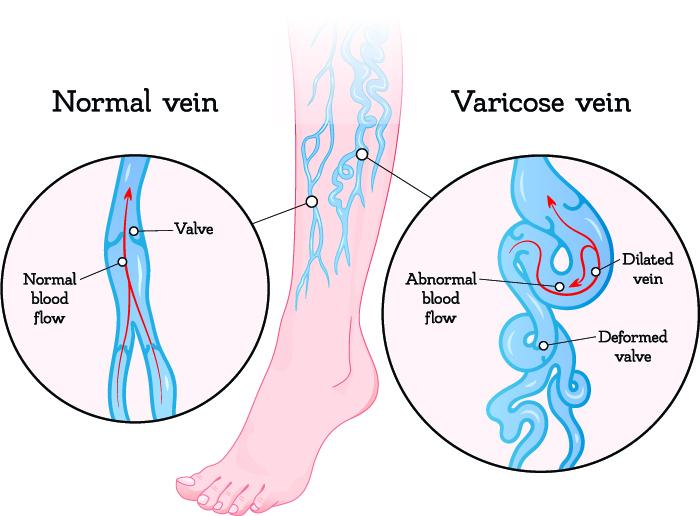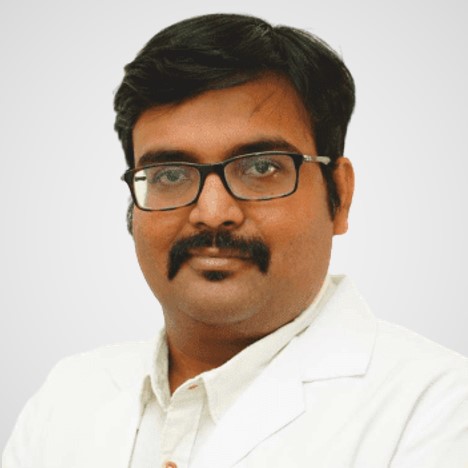Varicose Veins Treatment in Kondapur, Hyderabad
Varicose veins are twisted, enlarged veins. Any superficial vein may become varicoses, but the veins most typically affected are those in your legs. That's because standing and walking upright increases the pressure within the veins of your lower body.
What is Varicose Veins?
Varicose veins, also referred to as varicoses, happen when your veins become enlarged, expanded, and overfilled with blood. Varicose veins normally appear swollen and raised, and have a bluish-purple or red color. They’re often very painful.

What are the symptoms of Varicose Veins?
In the majority of cases, these are the common symptoms of varicose veins:
- veins look twisted, swollen, and bumpy
- the veins are blue or dark purple or red
Some people may also experience:
- aching legs
- legs feel heavy, especially after exercise or at night
- fat under the skin, above the ankle, become hard
- swollen ankles
- irregular whitish blotches that look like scars appear at the ankles
- Serious pain after sitting or standing for too long
What are the causes of Varicose Veins?
Damaged valves can lead to varicose veins.
Other causes for varicose veins include:
- family history of varicose veins
- obesity
- standing for long periods of time
- age over 50
- menopause
- pregnancy
When to see a doctor?
Make an appointment to see a doctor if you experience these symptoms:
- Heavy legs
- Burning, aching over an enlarged vein
- Muscle cramping at night
What are the risk factors for developing Varicose veins?
- Gender: Varicose veins affect more women than males.
- Genetics: Varicose veins run in some families.
- Obesity: Being overweight or obese increases the possibility.
- Age: The risk rises with age, due to wear and tear.
- Some jobs: A person who has to stand at work for a long time may have a higher risk of developing varicose veins.
What are the Complications of Varicose Veins?
A condition in which there is no proper blood flow has a risk of complications. However, in most of the cases, varicose veins have no complications. But if complications do occur, they may include:
- This usually causes minor bleeding but it requires medical attention.
- Blood clots in the vein of the leg cause swelling of the vein.
- Ulcers may form on the skin near varicose veins. See your doctor immediately if you've developed an ulcer.
How can we prevent Varicose Veins?
Take these preventive measures to reduce the risk of developing varicose veins:
- get plenty of exercise
- maintain a healthy weight
- avoid standing still for too long
- do not sit with the legs crossed for a long time
- sit or sleep with your feet raised by pillow
Anyone who has to stand for their job should move around at least every 30 minutes.
How is Varicose Veins Diagnosed?
Your doctor might perform an ultrasound test to check the blood flow in your veins. He might also examine your veins and legs while you are sitting or standing.
How can we treat Varicose Veins?
Surgery
If your varicose veins are causing a lot of pain or damaging your overall health, your doctor might try a procedure. Vein ligation and stripping is a surgical treatment that requires anesthesia. The surgeon makes cuts in your skin, cuts the varicose vein, and removes it.
Sclerotherapy
It is usually done for the superficial visible dilated vein. It involves injecting chemicals, known as sclerosing agents, into damaged veins.
Compression
Compression socks or stockings are specially designed garments which prevent congestion of blood in the legs. These place enough pressure on your legs so that blood can flow easily to your heart. They also decrease inflammation.
Conclusion
Varicose veins generally get severe with time despite making required lifestyle changes. However, they might look unpleasant, they do not lead to long-term health issue.
Request an appointment at Apollo Spectra Hospitals, Kondapur
Call 1860-500-2244 to book an appointment
Varicose veins can grow worse over time. If left untreated, varicose veins may cause conditions such as inflamed veins or chronic wounds or ulcers.
Unfortunately, there is no way to completely prevent varicose veins, but you can exercise regularly and avoid standing or sitting for long periods of time.
Self-help measures can help relieve the pain and may prevent them from getting worse. But if the measures are not successful, then it's time to see one of our doctors.
Symptoms
Our Doctors
DR. SANJEEV RAO K
MBBS,DRNB (Vascular)...
| Experience | : | 13 Yeras Experience |
|---|---|---|
| Speciality | : | Vascular Surgery... | Location | : | Kondapur |
| Timings | : | Mon- Sat: 5:00 PM to... |
Our Top Specialities
NOTICE BOARD
CONTACT US
CONTACT US
 Book Appointment
Book Appointment



.svg)
.svg)
.svg)
.svg)








